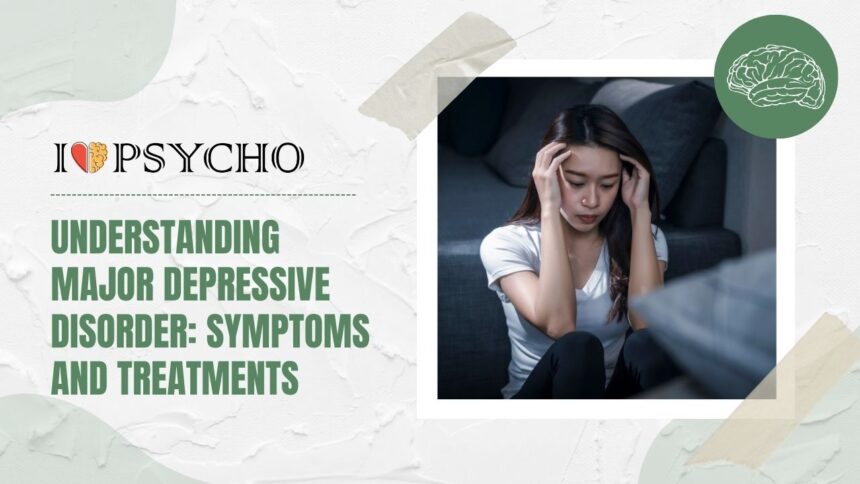Introduction to Major Depressive Disorder (MDD)
Welcome to a guide that sheds light on the complexities of Major Depressive Disorder (MDD). In this blog, we will delve into the symptoms, treatments, and strategies for managing MDD. If you or a loved one are navigating through the challenges of depression, this article is here to offer insights and support. Let’s embark on a journey to understand MDD together.
Symptoms of MDD
Major Depressive Disorder (MDD) can manifest in various ways, impacting both mental and physical well-being. One common symptom is persistent sadness or low mood that lasts for most of the day. Individuals with MDD may lose interest in activities they once enjoyed, feeling a sense of emptiness instead.
Changes in appetite and weight, either an increase or decrease without trying, are also prevalent symptoms of MDD. Sleep disturbances such as insomnia or oversleeping can disrupt daily routines and contribute to feelings of fatigue and lethargy.
Difficulty concentrating, making decisions, or remembering things are cognitive symptoms often experienced by those with MDD. Physical symptoms like headaches, muscle aches, and digestive issues can also accompany the condition.
Feelings of worthlessness or guilt that seem overwhelming along with recurrent thoughts of death or suicide warrant immediate attention from healthcare professionals if experienced.
Risk Factors for Developing MDD
It’s essential to understand the various risk factors that can contribute to the development of Major Depressive Disorder (MDD). Genetics play a significant role, as individuals with a family history of depression are more prone to experiencing MDD themselves. Environmental factors such as trauma, abuse, or chronic stress can also increase the likelihood of developing this mental health condition.
Additionally, certain personality traits like low self-esteem or pessimism may heighten vulnerability to MDD. Other medical conditions such as chronic illness or substance abuse issues can further elevate the risk. Age and gender are also factors to consider, with women being more likely than men to experience depression.
Recognizing these risk factors is crucial in early intervention and prevention strategies for MDD. By addressing these potential triggers proactively, individuals can take steps towards better mental well-being and seek appropriate support when needed.
Diagnosis for MDD
Diagnosing Major Depressive Disorder (MDD) involves a comprehensive evaluation by a healthcare professional, typically a mental health provider or psychiatrist. The process usually includes discussing symptoms, medical history, and any family history of depression.
To diagnose MDD accurately, the healthcare provider may use various assessment tools like questionnaires or standardized tests to evaluate the severity of symptoms and their impact on daily life. It’s crucial to rule out other medical conditions that could be causing similar symptoms before confirming an MDD diagnosis.
A key aspect of diagnosing MDD is assessing the duration and persistence of symptoms. For a formal diagnosis, depressive symptoms should persist for at least two weeks and significantly interfere with daily functioning.
It’s important to remember that seeking help for proper diagnosis is essential in managing MDD effectively. If you suspect you or a loved one may have MDD, don’t hesitate to reach out to a healthcare professional for guidance and support.
Medications and Therapy for MDD
When it comes to treating Major Depressive Disorder (MDD), medications and therapy play crucial roles in helping individuals manage their symptoms and improve their overall well-being.
Medications such as selective serotonin reuptake inhibitors (SSRIs) or serotonin-norepinephrine reuptake inhibitors (SNRIs) are commonly prescribed to help regulate brain chemistry and alleviate depressive symptoms. These medications can take time to show full effects, so it’s important to follow the treatment plan outlined by your healthcare provider.
Therapy, including cognitive behavioral therapy (CBT) or interpersonal therapy, is also a cornerstone of MDD treatment. Therapy sessions provide a safe space for individuals to explore their thoughts and emotions, learn coping mechanisms, and develop healthier ways of thinking.
Combining medication with therapy has been shown to be highly effective in managing MDD symptoms and promoting long-term recovery. It’s essential for individuals with MDD to work closely with their healthcare team to find the best treatment approach that suits their unique needs.
Lifestyle Changes that can Help with MDD
When dealing with Major Depressive Disorder, lifestyle changes can play a significant role in managing symptoms and improving overall well-being.
Regular physical activity, such as walking, yoga, or dancing can help boost mood and reduce stress levels. Prioritizing adequate sleep is crucial for mental health; aim for 7-9 hours of quality rest each night.
Maintaining a balanced diet rich in fruits, vegetables, whole grains, and lean proteins provides essential nutrients that support brain function. Limiting alcohol consumption and avoiding recreational drugs can also contribute to better mental health.
Engaging in activities you enjoy, whether it’s painting, gardening, or playing an instrument, can bring joy and a sense of accomplishment. Building a strong support system through relationships with friends or joining a support group can provide emotional stability during challenging times.
Practicing mindfulness techniques like meditation or deep breathing exercises can help manage stress and promote relaxation. Remember that small changes in your daily routine can make a big difference in how you feel each day.
Supporting a Loved One with MDD
Supporting a loved one with Major Depressive Disorder (MDD) can be challenging, but your presence and understanding mean more than you may realize. Simply being there to listen without judgment or trying to offer solutions can make a significant difference. Encourage them to seek professional help and assure them that it’s okay to not always feel okay.
Educate yourself about MDD so you can better understand what your loved one is going through. Be patient and empathetic, as MDD is not something that can be easily “fixed” overnight. Offer support in practical ways such as helping with daily tasks or accompanying them to therapy sessions if they’re comfortable.
Remind your loved one that they are not alone in their struggle and that seeking help is a sign of strength, not weakness. Check-in regularly, even if it’s just a simple text message letting them know you’re thinking of them. Your consistent support and compassion can make a world of difference in their journey towards healing.
Causes of Major Depressive Disorder
Major Depressive Disorder (MDD) is a complex condition with various contributing factors. While the exact causes of MDD are not fully understood, it is believed to be a combination of genetic, biological, environmental, and psychological factors.
Genetics can play a role in predisposing individuals to MDD. Research suggests that having a family history of depression may increase the risk of developing the disorder. Biological factors such as imbalances in neurotransmitters like serotonin and norepinephrine also contribute to MDD.
Environmental triggers such as trauma, loss, chronic stress, or major life changes can precipitate the onset of depression in susceptible individuals. Additionally, certain personality traits like low self-esteem or pessimism can make someone more vulnerable to developing MDD.
It’s essential to remember that each person’s experience with depression is unique, and what may cause one individual’s depressive episode may not apply to another. Consulting with healthcare professionals for personalized assessment and treatment is crucial when dealing with Major Depressive Disorder.
Common Treatment Options
When it comes to treating Major Depressive Disorder (MDD), there are several common options available. Medications, such as antidepressants, can help regulate brain chemicals and improve symptoms. Therapy, like cognitive behavioral therapy (CBT) or interpersonal therapy, can also be effective in managing MDD.
In some cases, a combination of medication and therapy is recommended for a comprehensive treatment approach. It’s essential to work closely with a healthcare provider to find the best treatment plan for each individual’s unique needs. Lifestyle changes, such as regular exercise, maintaining a healthy diet, and getting enough sleep, can also play a significant role in managing symptoms of MDD.
Support from loved ones and participation in support groups can provide additional emotional assistance during the treatment process. It’s important to explore different options and tailor the treatment plan to fit specific circumstances when addressing MDD symptoms.
Alternative and Complementary Therapies
Seeking alternative and complementary therapies can be a valuable addition to traditional treatments for Major Depressive Disorder. These options include acupuncture, yoga, meditation, and herbal remedies that aim to address the mind-body connection in managing symptoms of depression.
Acupuncture involves inserting thin needles into specific points on the body to help regulate energy flow and promote relaxation. Yoga combines physical postures, breathing exercises, and meditation techniques to reduce stress and improve overall well-being. Meditation practices focus on mindfulness and deep breathing exercises to calm the mind and enhance self-awareness.
Herbal remedies like St. John’s Wort or Saffron may also be explored under professional guidance due to their potential mood-boosting properties. It’s essential to consult with healthcare providers before incorporating these therapies into your treatment plan.
Coping Strategies for Living with MDD
Living with Major Depressive Disorder can be challenging, but there are coping strategies that can help manage symptoms and improve overall well-being. One effective strategy is to establish a daily routine that includes regular exercise, healthy meals, and sufficient sleep. Engaging in activities you enjoy, such as hobbies or spending time with loved ones, can also have a positive impact on your mood.
Practicing mindfulness and relaxation techniques like deep breathing or meditation can help reduce stress and anxiety levels. Setting realistic goals for yourself and celebrating small accomplishments along the way can boost self-esteem and motivation. It’s essential to reach out for support from friends, family, or a therapist when needed.
Taking care of your physical health by attending medical appointments regularly and following prescribed treatment plans is crucial in managing MDD effectively. Remember to be patient with yourself during the recovery process and prioritize self-care practices that promote mental wellness.
Conclusion
Living with Major Depressive Disorder (MDD) can be challenging, but it is essential to remember that help and support are available. By recognizing the symptoms, understanding the risk factors, seeking a proper diagnosis, exploring different treatment options including medications and therapy, making lifestyle changes, considering alternative therapies, and implementing coping strategies, individuals with MDD can manage their condition effectively.
Support from loved ones plays a crucial role in the journey towards recovery. It is vital to offer compassion, patience, and understanding to those struggling with MDD. By creating a supportive environment and encouraging them to seek professional help when needed, you can make a significant difference in their lives.
Remember that every individual’s experience with MDD is unique. What works for one person may not work for another. Therefore, it is essential to tailor treatments and support according to each individual’s needs.
By raising awareness about MDD, reducing stigma surrounding mental health conditions like depression, and fostering open conversations about mental well-being within our communities, we can create a more supportive and empathetic society for everyone affected by Major Depressive Disorder.









